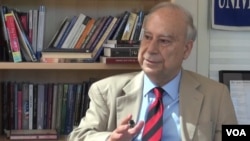Ambassador Akbar Ahmed is the award-winning author of Journey into America: The Challenge of Islam and the Ibn Khaldun Chair of Islamic Studies at American University in Washington, D.C.
Dubbed the "the world's leading authority on contemporary Islam," Ahmed, who served as Pakistan's High Commissioner to the U.K. and Ireland, spoke recently with VOA Deewa.
Reporter Nafees Takar began by asking him about radicalization among different generations of Muslims based in the West.
Professor Ahmed: The older generation came [to the West] from Pakistan, Bangladesh and so on. The younger generation is local. They are growing up in these [Western] countries. They are citizens. They want their rights. They want to be the part of their societies, but they feel they are being rejected and many of them are then going to the Middle East to Daesh [Islamic State], etc. So, there is a connection between what is happening to the communities and those who go off.
Takar: Why is the trend of extremism so attractive to [some Muslims] after they've settled in Europe or America?
Professor Ahmed: The reason is quite clear. When my generation came in the 1960s, I knew who I was. I knew my culture, I knew my background. No one could teach me about Islam. But the next generation growing up in the West is not very sure. They are not entirely comfortable with their parents’ generation and [its own brand of] Islam. They feel it is irrelevant to them and their problems. So, to whom do they go for guidance? They very often go to on the Internet and they pick up some imam somewhere in the Middle East, who then instructs them "this is Islam."
Takar: Professor, the Muslim youth were attracted to some extent to al-Qaida, then the Taliban. And now Daesh is becoming attractive to many youths in Europe and America.
Professor Ahmed: Daesh is a temporary phenomenon. It will not last because the acts it is committing — of violence, of sexual perversion, of killing Christians, Yazidis and other Muslims and so on — these have nothing to do with Islam. Blowing up statues has nothing to do with Islam as such, and I am shocked how they are doing it and claiming to represent Islam. And they have been condemned by orthodox and mainstream Muslims all over the world, not just people living in the West. But they still attract people in the West. This is the big question that you are asking. The answer is clear. If a person, a young man growing up in Britain or a young girl, like a young girl from Glasgow, who went off — a bright girl — you will see the pattern. They are not sure of who they are. They want to be Muslim. They want to be proud of Islam. They want someone to say "you are Muslim, welcome." And Daesh is claiming to represent Islam, rightly or wrongly, badly or properly. So they feel, perhaps the answer will be given by Daesh.
Takar: Professor Akbar Ahmed, many young Muslims will be watching this interview on Facebook or on Twitter or on television. How can they become a part of the mainstream societies while living in Europe or America?
Professor Ahmed: I would want the young generation to play the role of leaders for the entire communities and contribute to the societies they live, so the non-Muslims can say "these are the best local representative we have of our culture."
This full transcript of this interview has been edited for length.




